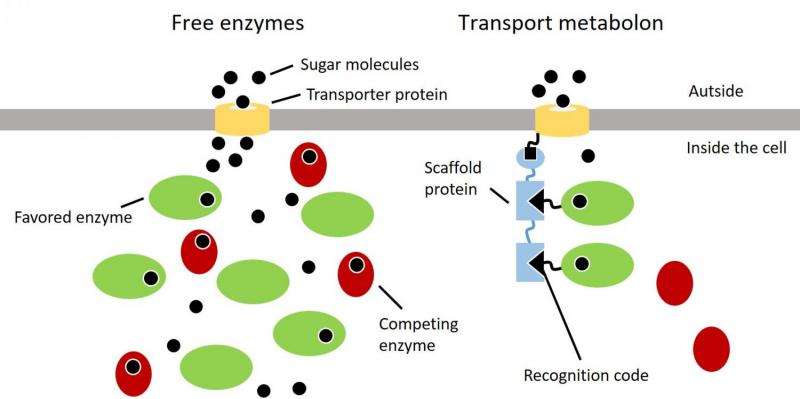More efficient use of raw materials with the aid of 'molecular conveyor belts'

Currently, making products such as fuels, synthetic materials or pharmaceuticals from renewable raw materials lacks efficiency because the microorganisms process the raw materials very slowly and generate many unwanted by-products. Biotechnologists at Goethe University Frankfurt have now succeeded in optimizing sugar utilization in baker's yeast.
Microorganisms such as baker's yeast can be compared to miniature factories: The raw materials (generally sugar) are conducted through gates (transport proteins) and converted in a multi-stage process with the help of enzymes. Microbes produce technologically desirable products, while also many by-products. This is due to the fact that various enzymes compete for sugar so that different building blocks important for the cell's survival are formed.
Thomas Thomik and Dr. Mislav Oreb from the Institute of Molecular Biosciences at Goethe University Frankfurt have now succeeded in channeling the metabolism of baker's yeast in such a way that sugar can be used more productively. In the latest issue of the renowned scientific journal Nature Chemical Biology, the researchers present a new mechanism by which the raw materials are delivered directly to the desired enzymes by transport proteins.
Mislav Oreb explains the principle: "We have built a scaffold protein that binds to the transport protein and then serves as a docking station for the desired enzymes. Recognition codes in the enzymes enable them to dock. The result is an accumulation of the desired enzymes near the transporter. In this way, the cell can process the raw material as on a conveyor belt, without the competing enzymes having a chance to convert it."
In their study, the biotechnologists show that the sugar xylose is converted into ethanol by such "molecular conveyor belts" (transport metabolons) more efficiently by minimizing the production of the unwanted by-product xylitol.
"The underlying principle could be used to make any manner of product from sugars, such as biofuels, synthetic materials or pharmaceuticals. The concept has the potential to make biotechnological processes more ecologically and economically sustainable, since efficient sugar utilization is a fundamental requirement for this," says Mislav Oreb.
More information: Thomas Thomik et al. An artificial transport metabolon facilitates improved substrate utilization in yeast, Nature Chemical Biology (2017).
Journal information: Nature Chemical Biology
Provided by Goethe University Frankfurt am Main















